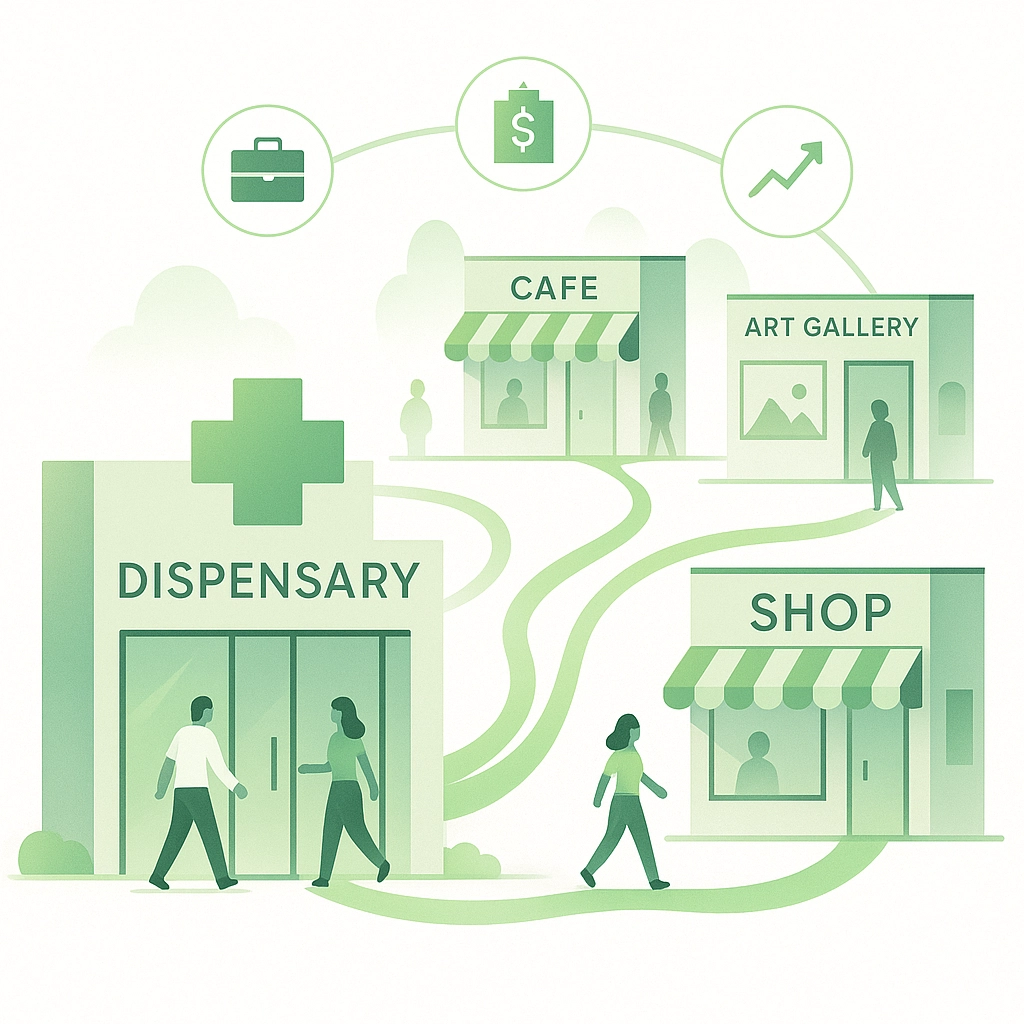The contemporary cannabis retail landscape presents consumers with a fundamental choice between supporting local dispensaries and patronizing large corporate entities, a decision that extends far beyond individual purchasing preferences to encompass comprehensive community transformation and enhanced personal cannabis experiences. Local cannabis dispensaries function as catalysts for economic development, social cohesion, and cultural advancement within their respective communities while simultaneously providing superior product access, personalized service, and educational opportunities that cannot be replicated through impersonal corporate channels. The systematic support of local cannabis retailers generates measurable benefits that permeate multiple aspects of community life, from job creation and tax revenue generation to cultural enrichment and social equity advancement.
Economic Impact and Community Development
Local cannabis dispensaries serve as fundamental drivers of economic growth within their communities through direct job creation, tax revenue generation, and support for ancillary businesses throughout the regional cannabis supply chain. These establishments create employment opportunities across diverse skill levels and professional categories, including budtender positions, cultivation specialists, compliance officers, inventory management personnel, and administrative roles that provide sustainable career pathways for community members. The employment generation extends beyond immediate dispensary operations to encompass local growers, product manufacturers, security services, accounting firms, and marketing agencies that collectively form a robust economic ecosystem centered around local cannabis commerce.
The financial contributions of local dispensaries to community infrastructure development occur through substantial tax revenue generation that funds essential public services, educational programs, infrastructure improvements, and community development projects. Local tax revenue from cannabis sales remains within the community rather than being distributed to distant corporate headquarters, creating sustained funding streams for municipal services and community enhancement initiatives. The economic multiplier effect generated by local cannabis spending ensures that revenue circulates through multiple local businesses, creating sustained economic activity that benefits restaurants, retail establishments, service providers, and other community enterprises.

Community-owned and locally operated dispensaries demonstrate superior commitment to regional economic development through reinvestment strategies that prioritize community benefit over pure profit maximization. These establishments frequently support local artists, sponsor community events, fund youth programs, and contribute to charitable organizations that address specific community needs and social challenges. The collaborative approach adopted by local dispensaries extends to partnerships with other local businesses, creating networking opportunities and cross-promotional strategies that strengthen the entire local business ecosystem.
Enhanced Customer Experience and Product Access
The customer experience provided by local cannabis dispensaries demonstrates significant superiority to corporate alternatives through personalized service, product expertise, and relationship-building that creates lasting customer satisfaction and loyalty. Local budtenders develop comprehensive understanding of individual customer preferences, medical conditions, consumption patterns, and lifestyle requirements, enabling them to provide tailored product recommendations and guidance that optimize therapeutic outcomes and recreational experiences. The personal attention and customized service offered by local dispensaries creates educational opportunities for customers to expand their cannabis knowledge while receiving expert guidance regarding strain selection, consumption methods, and dosage optimization.
Local dispensaries maintain closer relationships with regional cultivators and craft cannabis producers, ensuring access to high-quality, fresh products that reflect local growing expertise and unique terroir characteristics. The direct connection to local cultivation operations enables dispensaries to offer exclusive strains, limited-edition products, and seasonal varieties that are not available through large-scale corporate distribution networks. The emphasis on local sourcing ensures product freshness, reduces transportation-related environmental impact, and supports regional agricultural development within the cannabis industry.
The product curation and selection processes employed by local dispensaries reflect deep understanding of customer needs and market demands rather than corporate inventory management strategies focused solely on profit margins. Local dispensaries often feature diverse product portfolios that include organic options, craft concentrates, artisanal edibles, and specialty products that cater to sophisticated consumer preferences and specific therapeutic requirements. The commitment to product quality and diversity enables customers to explore new products and brands while maintaining confidence in product safety and efficacy.
Community Building and Social Integration
Local cannabis dispensaries function as community gathering spaces that facilitate social connections between cannabis enthusiasts, medical patients, industry professionals, and community members while reducing stigma and promoting understanding of cannabis culture and benefits. These establishments regularly host educational workshops, product demonstrations, strain tastings, cooking classes, and social events that create opportunities for knowledge sharing and community building among diverse groups of cannabis consumers. The community-focused approach adopted by local dispensaries helps normalize cannabis use while promoting responsible consumption practices and safety awareness.

The educational initiatives provided by local dispensaries extend beyond product sales to encompass comprehensive community outreach programs designed to inform the public about cannabis science, medical applications, legal considerations, and responsible use practices. Through partnerships with healthcare providers, educational institutions, and community organizations, local dispensaries contribute to public education efforts that address misconceptions about cannabis while promoting evidence-based understanding of its therapeutic potential and safety profile. The educational programming offered by local dispensaries creates informed consumer communities that make better decisions regarding cannabis use and advocacy.
Local dispensaries actively participate in community events, festivals, and civic activities that demonstrate their commitment to being positive community members rather than merely commercial enterprises. The community involvement includes sponsorship of local sports teams, participation in charity drives, support for cultural events, and collaboration with local government on policy development and implementation. These community engagement activities help build trust and acceptance while establishing local dispensaries as valuable contributors to community life and social cohesion.
Social Equity and Accessibility Advancement
The role of local dispensaries in promoting social equity within the cannabis industry extends beyond basic compliance with equity programs to encompass meaningful support for individuals and communities disproportionately affected by cannabis prohibition and criminalization. Local dispensaries often prioritize hiring practices that provide opportunities for individuals with prior cannabis-related convictions, creating pathways for community members to participate in the legal cannabis economy regardless of their history with the justice system. The equity-focused approach demonstrates commitment to repairing harm caused by decades of prohibition while building inclusive business practices that reflect community values.
Community-owned dispensaries frequently offer more accessible pricing structures and flexible payment options that serve customers across diverse economic circumstances, ensuring that medical patients and consumers with limited financial resources can access quality cannabis products. The pricing strategies employed by local dispensaries often reflect community needs rather than maximum profit extraction, creating affordable access to essential cannabis products for patients managing chronic conditions or other medical requirements.
Local dispensaries contribute to equity advancement through support for minority-owned cannabis businesses, women-owned enterprises, and social equity operators who face barriers to entry in the competitive cannabis marketplace. The commitment to supporting diverse suppliers and business partners helps create opportunities for underrepresented groups while building supply chains that reflect community demographics and values.
Implementation and Community Engagement
The systematic support of local cannabis dispensaries requires intentional consumer choices that prioritize community benefit over convenience or minor cost savings available through corporate alternatives. Consumers can maximize their community impact through consistent patronage of local establishments, participation in educational events and community activities, and advocacy for policies that support local cannabis businesses. The cumulative effect of community support enables local dispensaries to expand their operations, increase employment opportunities, and enhance their contributions to community development and social programs.
The evaluation criteria for selecting local dispensaries should encompass factors including community involvement, employee treatment, environmental practices, product quality, and commitment to social equity rather than focusing exclusively on price considerations or convenience factors. Dispensaries such as Groth Industries demonstrate comprehensive commitment to community development through local sourcing, educational programming, and active participation in regional economic development initiatives that create lasting positive impact.
The transformation of communities through local cannabis dispensary support requires sustained engagement and conscious consumer choices that recognize the broader implications of purchasing decisions on community development, social equity, and economic growth. Does your current cannabis purchasing pattern contribute to local community development and social advancement?

